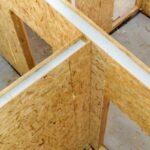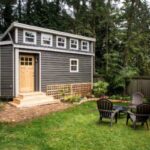What is a “detached accessory dwelling unit”?
A detached accessory dwelling unit (DADU) is a self-contained living unit that is located on the same property as a primary dwelling unit, but is detached from it. DADUs have become increasingly popular in recent years as a way to provide additional housing options and increase the flexibility of property use, particularly in urban areas where housing is expensive and in short supply.

DADUs are sometimes also referred to as backyard cottages, granny flats, or in-law suites. They typically include a kitchen, bathroom, and sleeping/living area, and can range in size from 200 to 1,200 square feet.
DADUs are different from other types of accessory dwelling units (ADUs) in that they are detached from the primary dwelling unit. This provides more privacy and a greater sense of separation between the two units. DADUs can also be designed to blend in with the surrounding landscape and architecture, making them a more seamless addition to the property.
There are several benefits to having a DADU on your property. These include increased housing options, flexibility of use, rental income, increased property value, and improved quality of life for both occupants. A DADU can provide additional housing options for family members, renters, or guests. It can also be used for a variety of purposes, including as a rental unit, home office or studio, or as a space for aging parents or adult children.
If you’re thinking of building a DADU on your property, there are several things to keep in mind. These include zoning and building regulations, access and parking, and design considerations.
DADUs are subject to zoning and building regulations that dictate their size, height, setback requirements, and other design features. It’s important to check with your local zoning department to determine what the regulations are in your area.
Access to the DADU should be easy and safe, and there should be adequate parking available for both the primary dwelling unit and the DADU. Design considerations include making sure that the DADU is well-designed and constructed, and that it blends in with the surrounding landscape and architecture.
Overall, a DADU can be a valuable addition to your property, providing additional housing options and increasing the flexibility of property use. If you’re considering building a DADU, it’s important to do your research and make sure that you’re following all zoning and building regulations, as well as taking into account access, parking, and design considerations.
One of the biggest benefits of a DADU is the increased housing options it provides. With the rising cost of housing in many urban areas, a DADU can provide an affordable housing option for family members, renters, or guests. It can also be used as a short-term rental property, generating rental income for the homeowner.
In addition to the financial benefits, a DADU can also provide a higher quality of life for both the primary dwelling unit occupants and the DADU occupants. For example, aging parents or adult children can have their own space while still being close to family members. A DADU can also be used as a home office or studio, providing a quiet and private space for work or creative pursuits.
When considering building a DADU, it’s important to keep in mind the zoning and building regulations in your area. Many cities and municipalities have specific regulations regarding the construction of DADUs, including size, height, setback requirements, and design features. It’s important to do your research and obtain any necessary permits before beginning construction.
Another important consideration is access and parking. The DADU should be easily accessible from the primary dwelling unit, and there should be adequate parking available for both the primary dwelling unit and the DADU. This is particularly important if the DADU will be used as
a rental property, as renters will need a safe and convenient place to park their vehicles.
Design considerations are also important when building a DADU. The design should be well-considered, taking into account the surrounding landscape and architecture. The goal is to create a DADU that blends seamlessly with the surrounding environment, rather than standing out as an eyesore.
Fortunately, there are many different design options available for DADUs, and many architects and builders are experienced in creating custom designs that meet the needs and preferences of the homeowner. Some popular design options include modern or minimalist designs, traditional cottage-style designs, and even eco-friendly designs that incorporate sustainable materials and energy-efficient features.
In addition to these practical considerations, there are also many benefits to building a DADU from a social and cultural perspective. DADUs can help to promote a sense of community and reduce social isolation, particularly in urban areas where many people feel disconnected from their neighbors.
For example, a DADU can be used as a space for community events or gatherings, providing a focal point for social interaction and connection. Additionally, the presence of a DADU can help to promote a sense of safety and security in the community, as there are more eyes on the street and more people around to watch out for one another.
In conclusion, a detached accessory dwelling unit can be a valuable addition to any property, providing increased housing options, rental income, and improved quality of life for both primary dwelling unit occupants and DADU occupants. However, it’s important to carefully consider zoning and building regulations, access and parking, and design considerations before beginning construction.
By doing your research and working with experienced professionals, you can create a DADU that meets your needs and preferences while also complying with local regulations and enhancing the overall aesthetic and functionality of your property. Whether you’re looking for a space for aging parents, a rental property to generate income, or a quiet and private space to work or create, a DADU can be an excellent solution.
If you are interested in building a DADU, and live in Pierce County, King County, or Thurston County Washington, we’d love the opportunity to earn your business. Please give us a call at 253-248-5081 for a free, no-obligation assessment.
If you think you’re ready, check out our most popular models.


